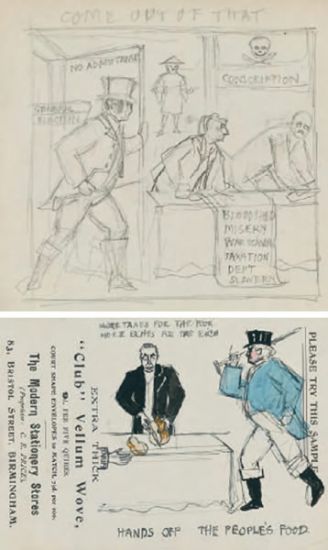
Five sketchbook sheets, circa 1916
Unmounted (ref: 2579)
Pencil and watercolour, 4 1/2 x 6 3/4 in. (11.4 × 17.2 cm.)

Pencil and watercolour, 4 1/2 x 6 3/4 in. (11.4 × 17.2 cm.)
Variously signed and inscribed:
‘Come Out of That’ – John Bull threatening the anti-conscriptionists
‘More Taxes for the Poor/ More Riches for the Rich’
Appeal Tribunal 30.iii.1916 – J S Taylor, Pritchett and Geo. Ryder
‘To Fight against German Militarism’, London 10.iv.1916
Sheet of Studies 22.vii.1916 – Geo. Lansbury, Hon Bertrand Russell and F.W. Jowett MP
Provenance: Estate of Mrs A.E. Southall; Mrs Elizabeth Baker ; Mr and Mrs Peyton Skipwith.
Southall
came from distinguished Quaker and Chartist stock, and was involved in
radical politics in Birmingham from the mid-1890s. He was an ardent
pacifist, serving for many years as Chairman of the Independent Labour
Party, although he was expelled from the official Labour Party for
supporting a Communist against Sir Austen Chamberlain. In one of his
sketchbooks for 1913 he defined what he regarded as the three greatest
evils threatening Europe at the time: ‘The military system, the factory
system and the clerical system. ’With the advent of war in 1914 he set
about fighting these through his art, denouncing jingoism, lampooning
John Bull, and caricaturing the military as well as the tribunals set up
to hear the cases of conscientious objectors. Many of these satirical
cartoons were published in pamphlet form, the most famous being The
Obliterator (1918), which sarcastically proclaimed that it was ‘supplied
impartially to all civilised Governments and has given entire
satisfaction. It is guaranteed to leave nothing standing and nothing
breathing’. In addition to attacking the system through pen and pencil
he attended many pacifist and other left-wing meetings, always with
sketchbook to hand.Whilst participating in the debate, he would quietly
observe and draw those with whom he shared the platform, as in the case
of the present sheet with its neat studies of George Lansbury, Bertrand
Russell and F.W. Jowett. Southall’s war was a war againstWar . (For an
extended account of Southall’s political and pacifist views, see George
Breeze, ‘Joseph Southall and the Pursuit of Peace’, in SixtyWorks by
Joseph Southall, 1861–1944, exh. cat., Fortunoff Collection, Fine Art society, London, 2005.)
We are grateful to Peyton Skipwith for the above catalogue note.